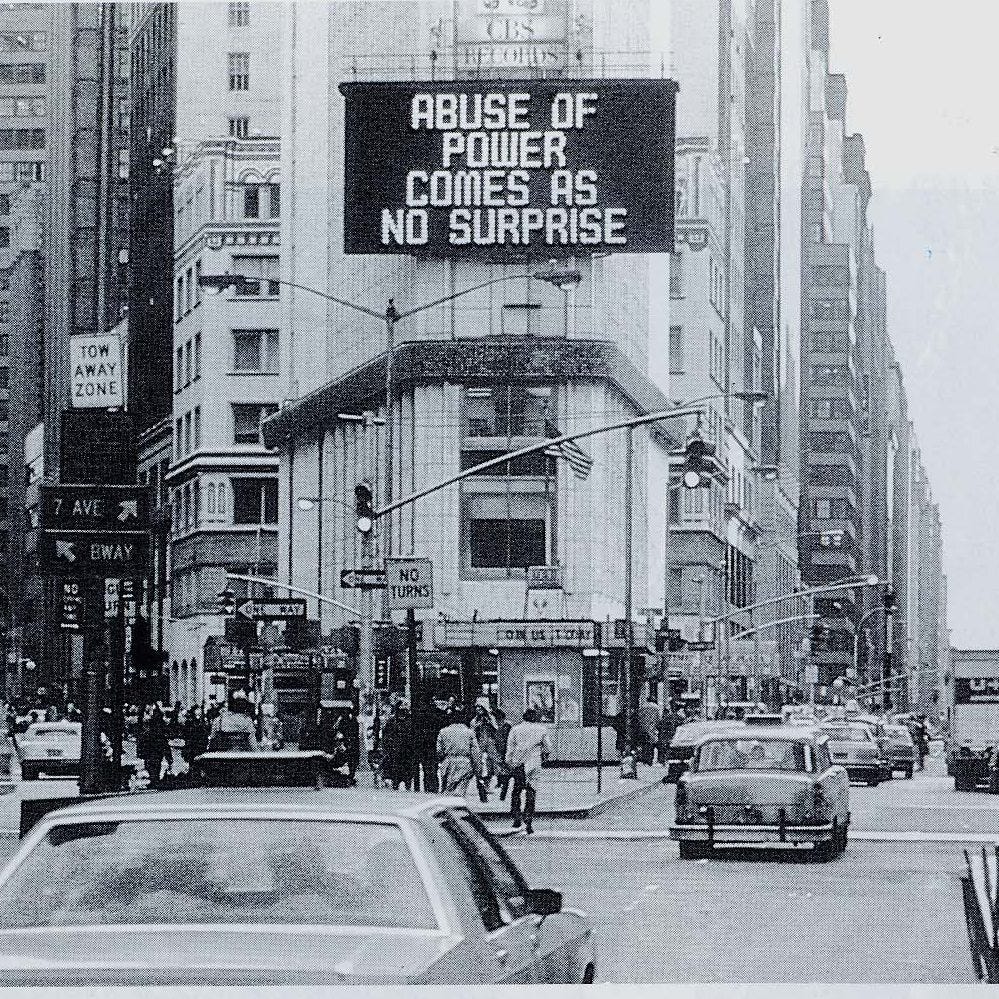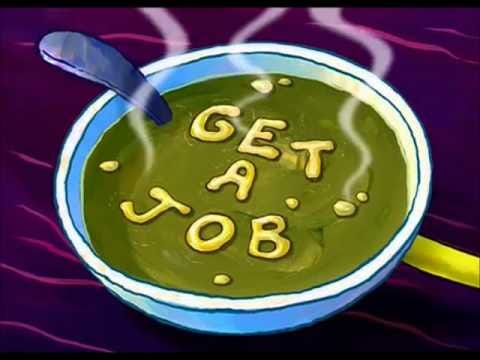On celebrity culture and the abuse of power on platforms

‘Abuse of Power Comes As No Surprise’ by Jenny Holzer from the “Truisms” series featured on a light board in Times Square for the Public Art Fund’s “Messages to the Public” exhibition in 1982 via WIA
Last year, my name made headlines for all the wrong reasons. I was simply doing my job as an associate music editor at the time by writing a review of an EP that everyone I knew was going to be talking about that day. Given the high level of fame that this artist has reached, I never expected her to actually read the review. What happened next was a whirlwind—a few hours after the review went live my Twitter notifications started blowing up. Swarms of strangers were telling me to choke, demanding that I get fired, and an assortment of other vile comments. I’d heard it all before from an encounter with another fanbase a few years prior, but this incident was different because the hit squad had been commanded to attack directly by their idol. She had posted a screenshot of the review with my name fully visible, lashing out over one single typo and accusing me of being “out of touch.”
I thought about responding to the whole situation with a declaration about the ongoing war on criticism, but then I received an email from USA Today. They were going to run a story about the incident and wanted a comment. That was when I knew that I was being watched and anything that I said could potentially be used against me. This wasn’t funny, it was serious, and there was a possibility that I could be punished for the massive attention this exchange was receiving. I had to inform my boss, department director, and then the founder of the company. I also had to allow the PR director to speak on my behalf which made me slightly uncomfortable. I felt like I had been bullied into silence, by a white woman no less, and it was suffocating. If it weren’t for serving jury duty the next day and turning off all notifications, I might have imploded. (I almost nearly broke my sobriety from the stress, but didn’t want to give anyone the satisfaction.)
A few days later, everyone moved on to the next big story and I was relieved for things to go back to normal again. I wasn’t the only writer that would put out a negative review about the project, but because I was the first I received the worst of the wrath. All the while, no one ever publicly came to my defense online and that stung the most. My colleagues cheered me on and friends in the industry told me that their co-workers had been talking about the exchange and were on my side, but none of them seemed willing to stand by me externally on their feeds—it was quiet on these digital streets.
The very famous singer deleted her tweets, but the damage had already been done. I’ve never expected to receive an apology (although I am definitely owed one), but sometimes I wonder if she considered how harmful that situation could have been for me. You can’t just erase the experience of trauma once it has been inflicted. I suppose that my greater impact is that this artist took the unsolicited advice that I gave at the end of the review to heart because over a year has passed and the other parts of that trilogy have yet to surface.
Last September, we all watched Lana Del Rey go off on a well-known NPR critic for an in-depth review of Norman Fucking Rockwell that she strongly disagreed with. No doubt that the stans were vicious, but what I found interesting was the way in which peers came to the critic’s defense. Not only did the discourse become an event on Twitter, but a handful of op-eds and essays were published about the role of music criticism in the age of social media. What I’ve now realized is that when women of color, specifically Black women, are terrorized by a fanbase they are rarely, if ever, protected. When my friend, Najma Sharif, a Black Muslim woman, wrote a piece questioning Beyoncé’s relationship with capitalism back in February, the Hive showed no mercy. This intensity from devoted stans stops those without skin thick enough to endure the backlash from critiquing similar artists on this level.

A screenshot from a scene in an episode of Nickelodeon’s Spongebob Squarepants with a bowl of alphabet soup that spells out “get a job”
Modern stan culture has bred a toxic environment full of confirmation bias where celebrities often abuse their power by condoning unacceptable and inexcusable behavior under the guise of “building community.” When you have a sizable platform it becomes your responsibility to keep your people in line when they are following your every command. Personally speaking, I would never ever condone bullying in any form on my behalf. Too many folks are voluntarily turning a blind eye to full-on harassment that has the potential to escalate into violence—this applies to people working in media as well. Nobody deserves to live in fear and you can be supportive without dragging down others in the process. There are also far more productive ways to utilize your time.
Stans treat journalists and reporters like villains when they are literally just trying to do their jobs that they aren’t even fairly compensated for. Critics shouldn’t have to explain themselves if you disagree with their personal opinion. I don’t agree with every review that I read about the artists that I consider myself to be a fan of, but you don’t see me flocking to the writer’s feeds with wishes of death upon them. In July, a Pitchfork editor was doxxed by Taylor Swift fans after publishing a POSITIVE review of her latest album. Halsey’s insensitive “joke” calling for the collapse of “the basement that they run P*tchfork out of” in response to an unsatisfactory review only backfired because the office happened to be located at One World Trade Center.
My friend Kindness has always been vocal about the fact that “musicians should never, ever, ever, enter into any kind of relationship with fans” once they reach a “certain level of visibility” in their career. This train of thought was in regards to situations where people in power take advantage of fans in a sexual manner, but can also be applied to the scenarios that are being unpacked here. Once that line is blurred, there’s no turning back.

While there are rare moments where the power of stans is used for good like when K-Pop stans trolled T****, too often boundaries are crossed on both sides. I’ve now seen friends get ambushed by paparazzi at their most vulnerable moments with the knowledge that those images will live on the Internet forever. Countless celebrities have experienced stalking to the point where their homes were broken into and other disturbing violations of privacy. Cardi B finally got fed up and vented about how her fans have gotten out of control for constantly telling her how to live her life on Instagram Live, then temporarily deactivated her Twitter account.
When news broke about the tragic death of Frank Ocean’s brother this summer, many fans found a way to make a private family matter all about themselves. A few people even had the audacity to tweet about how “Future Free will never sound the same” when the Breauxs lives will literally never be the same. I watched as his mother’s Instagram page became flooded with comments before she even uploaded a post about their loss. Sometimes the best way to show your respect for someone is to leave them alone to grieve in peace, especially when you don’t personally know them or their pain.
Before I made the transition from fangirl to journalist, I wholeheartedly believed that music was my religion and practically worshiped at the altar of my favorite artists. But the more interactions that I had with musicians while on the job, the less mesmerized I became by the spectacle of it all. Not every interview has been perfect along the way but at the very least has opened my eyes to the duality of these talented individuals. Because of the universal obsession with celebrity culture that is often perpetuated by the media, artists become idolized to the point where they are no longer viewed or treated as human beings with lives of their own.
End note: While you’re still here, it’s worth looking into the controversy that the cartoonist Bianca Xunise experienced—she was silenced in the form of censorship over white tears being shed from a comic about “how white people see issues that affect black peoples as trivial” through the lens of the mask debate. You should also check out Marianne Eloise’s piece on the much-needed separation of fan and stan!




